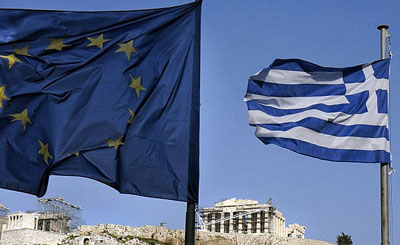Greece: fears for more cuts and tax increases will be needed to unlock bailout loans

Greece Fears More Austerity Pain Ahead to Unlock Bailout Loans
Nationwide strike called to protest cuts as talks progress with creditors
The outlook for Europe’s most depressed economy hinges on how talks progress between the Greek government and its creditors, say businesspeople, officials and economists here.
“I don’t think there will be a solution anytime soon,” says Yannis Stathoris, who owns a cheese factory in this beachside town. His company Stathoris Dairy, launched a decade ago, has grown despite the debt crisis, and even holds the record for making the world’s largest goat cheese, weighing over 2,000 pounds.
But Greece’s latest talks with the International Monetary Fund and European institutions, began this month, raising fears that more sharp spending cuts and tax increases will be needed to unlock bailout loans.
Mr. Stathoris worries the talks could revive doubts about Greece’s place in Europe’s common currency. “I fear we could be heading for bankruptcy and an exit from the euro,” he says.
The government of Prime Minister Alexis Tsipras is caught between creditors’ demands for fiscal retrenchment including pension cuts, and pressure from an austerity-weary public.
Public and private-sector unions have called a nationwide strike for Thursday to protest proposed pension changes, the third such walkout since Mr. Tsipras’s left-wing Syriza party was re-elected in September.
They will be joined by farmers, who have been fighting in recent weeks against the abolition of tax breaks for agriculture by impeding highway traffic.
Prolonged disagreement between the government and creditors could damage business and consumer confidence and, at worst, revive the specter of Greek debt default and euro expulsion, in a replay of last year.
An agreement wouldn’t bring much relief either, since it might well entail another round of austerity that saps demand.
With the economy still struggling under capital controls imposed in June, many economists say another year of recession is likely, deepening an eight-year slump that has wiped out a quarter of economic activity and pushed unemployment to 25%.
The government hopes this recession will at least be shallow. The finance ministry forecasts gross domestic product will shrink by 0.7% this year, versus a 1.3% contraction predicted in its bailout plan, drawn up last summer with the eurozone and the IMF.
Other forecasters are less optimistic. A survey of 10 economists by The Wall Street Journal found that, on average, the forecasters expect GDP to contract by 1.5%. Forecasts vary greatly, ranging from contractions of 2.9% to 0.2%. But the more recent the forecast, the worse it tends to be, and even optimists are tempering their enthusiasm.
Partly, that reflects concerns about global growth, whose weakening could hurt Greece especially through its vital tourism sector.
But the main reason cited for concern is the renewal of Athens’s struggle with the IMF and the eurozone.
If Greece is forced to cut pensions—a vital prop for dwindling household incomes, but a bill that the IMF says Greece can’t sustain—the government’s fragile majority in Parliament could crack, triggering a political crisis.
“Sky-high unemployment, capital controls and tighter fiscal policy will continue to keep the economy under pressure,” said Diego Iscaro, economist at London-based consultancy IHS Global Insight. How bad it gets “will depend on political developments.”
The deeper the contraction, the more the government is likely to fall short of its budget targets, leading to pressure from creditors to enact more spending cuts and tax increases.
In an ominous start to the latest talks, IMF head Christine Lagarde told Mr. Tsipras in Davos, Switzerland, in late January that Greece needs pension cuts to hit its fiscal targets, according to people familiar with the meeting.
Mr. Tsipras has vowed protect current pensions. The government wants to shrink the system’s huge financial shortfall by other means, including raising contributions by businesses and the self-employed.
The government’s proposal hasn’t convinced the IMF, but it is already sparking resistance among Greeks.
Athina Karantona says the proposal would threaten the survival of the bar she owns in the village of Stratoni, near Ierissos. Among other changes, the overhaul would scrap lower contribution rates for businesses in rural areas.
Her sales have already declined by around half during the crisis years, she says. Constant fear of unemployment prompts customers, mostly workers from a nearby mine, to cut their spending.
“From whiskey they switched to beers. From beers they are now switching to coffees,” says the energetic bar owner. “For the time being, the coffees are keeping my business alive.”
Source: WSJ – Greece Fears More Austerity Pain Ahead to Unlock Bailout Loans





























